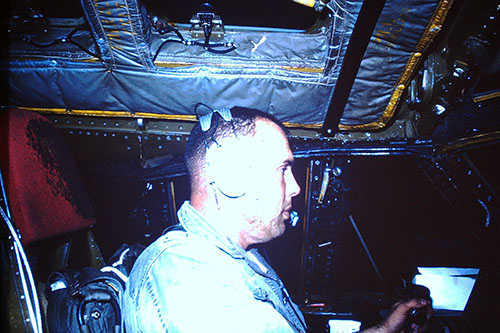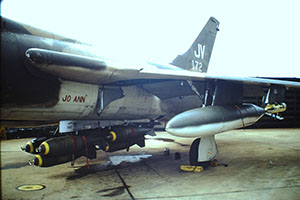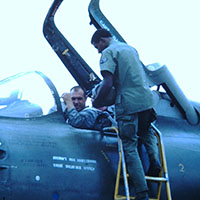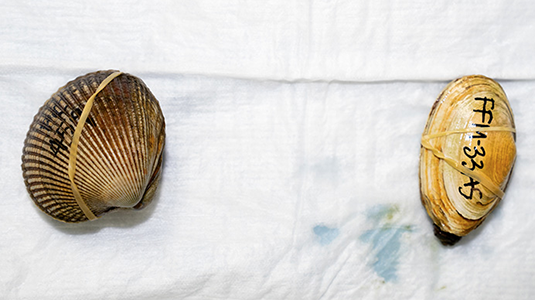— by Lin McNulty —
 We aren’t often aware of what islanders may have done before they arrived on Orcas. Many of us may be familiar with the piano stylings of Ron Myers, who, along with his wife Jo, moved to the island in 1992. His history as a fighter pilot, perhaps, is not as well known. Fighter pilot and pianist. Not necessarily a common denominator among the general populous.
We aren’t often aware of what islanders may have done before they arrived on Orcas. Many of us may be familiar with the piano stylings of Ron Myers, who, along with his wife Jo, moved to the island in 1992. His history as a fighter pilot, perhaps, is not as well known. Fighter pilot and pianist. Not necessarily a common denominator among the general populous.
Ron grew up in Orchards, Washington, just down the way from Vancouver, next to two airports. Watching those planes come and go was his inspiration for a career path. He wanted to be a pilot, and voiced that desire as he was growing up: “I’m going to fly one of those.”
On 31 August 1954, Myers joined the U.S. Air Force, but rather than becoming a pilot, he worked for Air Force Security Services as a Radio Traffic Analyst. He describes those duties as his most fascinating job, but won’t say much, if anything, about this assignment other than “it’s classified.” He turned down, however, a position with the National Security Agency for an opportunity to attend Officers Candidate School and then flight school.
 He had once said to Jo, when driving past Boeing Field and seeing a flight line of B-52s, “I’m going to fly one of those.” Upon graduation from pilot training in Missouri and Texas, the original class of 110 had been whittled down to 60 and aircraft preferences were assigned by final standing in the class. He assumed that the limited number of B-52 assignments would all be taken by the time they got to him. But no.
He had once said to Jo, when driving past Boeing Field and seeing a flight line of B-52s, “I’m going to fly one of those.” Upon graduation from pilot training in Missouri and Texas, the original class of 110 had been whittled down to 60 and aircraft preferences were assigned by final standing in the class. He assumed that the limited number of B-52 assignments would all be taken by the time they got to him. But no.
Fly B-52 bombers, he did. Stationed at Blytheville, Arkansas he soon realized why there had still been an open position for one more B-52 pilot. Not that it was known at the time, but Blytheville would become, in 2015, renowned as the “Most Dangerous City in Arkansas.” What he soon realized, however, was that it was a long, long trip to Memphis to be able to eat a McDonald’s burger, and he figured out that the other pilots who turned down a B-52 knew there was nothing at all going on in Blytheville in 1961 – 1967.
Myers’ time in Southeast Asia came after he volunteered for F-105 fighter assignment. Stationed in Korat, Thailand in 1968, his assignment was predicated on completing 100 sorties over North Vietnam. It took him eight months to reach that goal, often dive bombing at only 100-200 feet elevation over the targeted countryside. There were 26 crews in the squadron and 50 percent of the crews and planes were lost. His plane was hit five different times, but still kept on flying.
While in the air, he and another F-105 pilot were pulled on one occasion from their assignment to assist a group of Marines who were pinned down in an open field. The grove of trees was full of enemy soldiers and there was no way for the Marines to recover. Myers and his fellow pilot each made five passes, emptying their payload of 2,000 20mm gun rounds into the grove. The Marines were able to exit with no fatalities, no injuries, and without a shot being fired.
He recalls leading a force of four F-105s. They were instructed to locate and target the smoke marker that had been dropped on the ground by Forward Air Control. When he located the smoke, they bombed the site. A long period of silence followed when the other end of the radio told him, “not that smoke.”
After leaving the Vietnam War, he returned to his first love, the B-52 and was stationed in Minot, North Dakota. The B-52, he says, is a plane that “understands its mission,” and is the best military plane there is. “Some of the originals built in 1955 are still flying today.”
Whether he was in the midst of combat missions or classified intelligence, Myers always found a time and place for his music. “There was always a piano somewhere,” he notes. He found USO Clubs, Officers Clubs, and other locales that would employ musicians. The first dance band he played with, netted him an astounding $3.00 an hour.
When asked if he would do it again, if he would spend 30 years in the military, Myers does not hesitate when he says, “yes.” He emphasizes, “To have been given the opportunity to defend the United States was a gift to me.”
**If you are reading theOrcasonian for free, thank your fellow islanders. If you would like to support theOrcasonian CLICK HERE to set your modestly-priced, voluntary subscription. Otherwise, no worries; we’re happy to share with you.**








This is the best thing that has happened to me today when thinking of our Veterans! Thanks for the memorable story about my very own Father! Love you Daddy
Great story and person. Thanks Lin for writing the story to share with all of us.
Well done. Very happy you have joined all of us on Orcas.
Am so happy to have this real American hero still playing piano with Orcatrazz Swing Band. And he plays for free now
Jean and I have always enjoyed Ron’s music.
He did the piano background for Jean’s production of “The Fantasticks,” and when he has seen us when he was at the keyboard, he has immediately broken into one of the songs from that show.
We are amazed at his versatility: There’s a lot of difference between flying an agile fighter and piloting a big bomber.
For that matter, there’s also a lot of difference between flying a plane and zooming around on the keyboard.
Obviously, he’s done equally well at both.
Thanks for your service, Ron, and thanks for your music too!